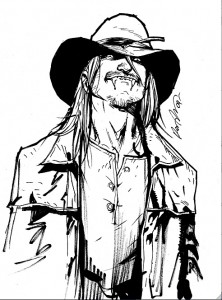It continues to amaze me how much interest my “Christian vampire” topics still generate. It’s one of the ways I got hooked up with Lea Lawrynowicz for the  Rue Morgue interview last year entitled “Divinity in Darkness: The Rise of Christian Horror.” Shortly thereafter, I was contacted via email by a writer from the Washington Post regarding the Christian vampire concept. And again this week, another newspaper reporter contacted me about doing a similar interview. In fact, last week Gina Holmes dropped me a note that another comment had been left on The Good Vampire, a Novel Journey article of mine from way back in 2007 that has since garnered 31 comments. All that to say, the topic just doesn’t want to die.
Rue Morgue interview last year entitled “Divinity in Darkness: The Rise of Christian Horror.” Shortly thereafter, I was contacted via email by a writer from the Washington Post regarding the Christian vampire concept. And again this week, another newspaper reporter contacted me about doing a similar interview. In fact, last week Gina Holmes dropped me a note that another comment had been left on The Good Vampire, a Novel Journey article of mine from way back in 2007 that has since garnered 31 comments. All that to say, the topic just doesn’t want to die.
The crux of my argument for a possible new breed of “Christian vampire” has always been, If vampires are fictional constructs, then why can’t they be good? Despite some Christian readers still nurturing qualms about that possibility, the general market continues to affirm that vampire fiction is an ever-morphing genre. Take Stephen King’s new comic book series American Vampire.
From Newsarama:
The idea behind “American Vampire” is that vampires can evolve, and because King’s vampire was turned in the Old West, he thrives in the sunlight of the desert and has powers that are distinctly American.
“As the vampire bloodline, over the last couple thousand years, has hit different populations at different times, it occasionally mutates into a new species of vampires,” [Scott] Snyder explained. “And so there’s this whole secret family tree of different species besides the dominant one that we’re aware of – the one that is the classic, nocturnal, blood-drinking, burned-by-the-sunlight species that came to dominate Europe.
“[Skinner Sweet] has all-new powers and all-new weaknesses. This breed of vampire is fiercer and stronger and meaner,” Snyder said. “He’s in the desert and out in the sunlight constantly. He’s more muscular and animalistic and feral. He isn’t well-mannered. He’s a creature who’s more suited to the deserts of Las Vegas and California than he is to the urban, more elegant settings where you can operate by night and hide by day. His fangs are longer and snakelike, and there’s a snakelike quality about how wide his jaw goes. And his claws are longer than the European vampires. So he definitely feels more indigenous to the American West, and the American landscape, than anything I’ve seen before.” (emphasis mine)
Apparently, the “evolved” vampire of King’s imagination actually “thrives in the sunlight.” Along with “all-new powers and all-new weaknesses,” this bloodsucker inhabits a fairly new terrain: the American West.
It all brings me back to my initial inquiry: If vampires are fictional constructs — which means they can derive power from the sunlight, sparkle, and resist their animal urges, among other things –– then why can’t they be good? And, in case you’re wondering, I still have a “Christian vampire” story in cold storage waiting to be wakened from its slumber…















Easy answer from me. I think vampires can be good. I think they represent the beast–or evil–that we all struggle with. So overcoming that inner demon, or whatever you want to call it, is the ultimate challenge. Don't we face that on a daily basis? Should I give in to my dark side or should I resist temptation? The vampire has taken it a step further though, in that he/she must do something evil in order to survive. Still, an awesome character challenge for a writer to explore.
"If vampires are fictional constructs, then why can’t they be good?"
It depends on how established it is. Some people would want writers to adhere to the current "canon" (a list of properties, really) of what a certain figure is — be it vampires or Star Wars characters. If we want to start shifting the properties of vampires, there needs to be SOME kind of retention, otherwise we can create any character and call them a vampire. The appellation becomes essentially meaningless.
What properties are we willing to change and what are fundamental?